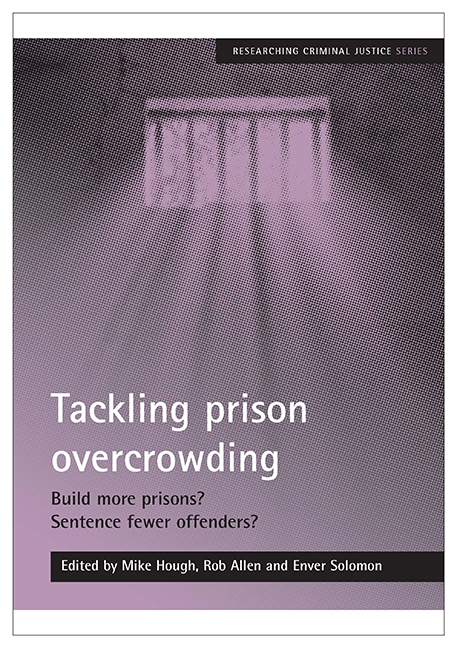Book contents
- Frontmatter
- Contents
- List of figures and tables
- Acknowledgements
- Foreword
- Notes on contributors
- 1 Introduction
- 2 The prisoners’ dilemma in England and Wales
- 3 Building on sand: why expanding the prison estate is not the way to ‘secure the future’
- 4 Towards more consistent and predictable sentencing in England and Wales
- 5 ‘Titan’ prisons: do size, efficiency and legitimacy matter?
- 6 Private punishment? An examination of the expansion, development and employment relations of private prisons
- 7 Reducing the use of custody as a sanction: a review of recent international experiences
- 8 Where now?
- 9 Endnote: latest developments in penal policy
6 - Private punishment? An examination of the expansion, development and employment relations of private prisons
Published online by Cambridge University Press: 25 March 2023
- Frontmatter
- Contents
- List of figures and tables
- Acknowledgements
- Foreword
- Notes on contributors
- 1 Introduction
- 2 The prisoners’ dilemma in England and Wales
- 3 Building on sand: why expanding the prison estate is not the way to ‘secure the future’
- 4 Towards more consistent and predictable sentencing in England and Wales
- 5 ‘Titan’ prisons: do size, efficiency and legitimacy matter?
- 6 Private punishment? An examination of the expansion, development and employment relations of private prisons
- 7 Reducing the use of custody as a sanction: a review of recent international experiences
- 8 Where now?
- 9 Endnote: latest developments in penal policy
Summary
Introduction
The growth of private prisons is an important, controversial but relatively neglected issue in the broader debate around private sector involvement in public services. Despite the presence of private prisons in the UK since 1992, the existence of 11 private prisons with more in prospect and the centrality of labour management to the success of private prisons, there is limited consideration of its implications especially in relation to Prison Service workers. As the study of private prisons by James et al (1997, p viii) notes, employment relations matters have ‘not been given the attention … which it undoubtedly merits’. This echoes concerns in the US on the ‘relatively scant body of research and evaluation of private prisons’ (Greene, 2003, p 57; Camp and Gaes, 2001). According to Gaes et al (US) private prisons are an area characterised by ‘more rhetoric than reality, more speculation than specifics and more postulation than proof ‘ (2004, p xi). Similar issues arise in the UK; indeed the paucity of evidence behind significant policy shifts is a theme that recurs in the US (Gaes et al, 2004), the UK (Ryan and Ward, 1989; Ryan, 2003) and Australia (Moyle, 1993). For a government committed to evidence-based policy making this neglect is of concern.
However, a range of, mainly official, research on the impact of private prisons enables a relatively robust composite picture to be drawn. This includes work from the House of Commons Public Accounts Select Committee (House of Commons PAC), the Prison Service, the Prison Service Pay Review Body (PSPRB), the National Audit Office (NAO) and the Prison Inspectorate. The Confederation of British Industry (CBI), the Institute of Public Policy Research (IPPR) and the Prison Reform Trust (PRT) have also made significant contributions. This research is particularly important as the Prison Service has been promoted as a model for sectors such as health and education. A growing body of international evidence on the impact of the private sector provision of prison services is also emerging and can provide useful insights into the UK experience (for example, Logan, 1990; Moyle, 1993; PRT, 1994; Schior 1995; Harding, 1997; Camp and Gaes, 2001; Miller, 2003; Parenti, 2003; Gaes et al, 2004).
This paper outlines the rationale for the adoption of private prisons and identifies the ostensible attractions of such prisons as well as examining the centrality of competition.
- Type
- Chapter
- Information
- Tackling Prison OvercrowdingBuild More Prisons? Sentence Fewer Offenders?, pp. 81 - 102Publisher: Bristol University PressPrint publication year: 2008



